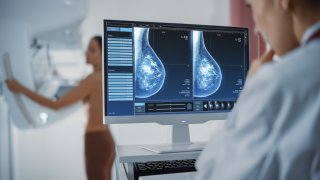

The following content has been provided by Virginia Hospital Center. This content does not represent the opinions of the NBC Washington news team. Click here to learn more about Virginia Hospital Center.
Many women under age 40 don’t feel they need to be concerned about getting breast cancer, unless they have increased risk due to family history or a positive test for the BRCA1 and BRCA2 gene mutations. After all, according to the National Cancer Institute, the median diagnosis age of breast cancer for women in the United States is 63. And, while the chance of getting breast cancer at age 60 is 1 in 28, the chance for a 30-year-old is only 1 in 204.
But statistics have a way of suddenly becoming personal. That was the case for Deanna Coll, a 30-year-old athletic trainer. When Coll stepped into the shower one day last March, she didn’t expect it to change her life. But she immediately knew something was off when she noticed a lump in her right breast. And she immediately took action. "If you feel something, get it checked out,” says Coll. “You are never too young.”
329 medal events. 32 sports. Endless drama. Catch all the action at the Paris Olympics. Sign up for our free Olympics Headlines newsletter.
Claire Edwards, MD, FACS, breast surgeon, at Virginia Hospital Center’s Reinsch Pierce Family Center for Breast Health, agrees. “Regular breast self-exams are helpful,” she says. “But today, the focus is more on breast health awareness—if it feels new, bring it to your doctor’s attention.”
After a visit to her primary care physician, Coll was referred to VHC, where she was seen by Christina Marks, MD, a radiologist with fellowship training in both interventional radiology and breast imaging.
A mammogram revealed extensive calcium deposits, unusual in someone as young as Coll. Some calcium deposits can be benign while others can indicate breast cancer. “We were fortunate that we started with a mammogram, rather than ultrasound,” notes Dr. Marks. “That was critical to her diagnosis because an ultrasound wouldn’t have shown the calcium deposits.”
A few days later, Dr. Marks performed a biopsy, which determined the diagnosis: invasive and noninvasive breast cancer (ductal carcinoma in situ or DCIS), which becomes invasive over time. “What Deanna had was rare for a 30-year-old. When most women detect a lump at that age, it is a benign cyst, fibroadenoma, or normal dense breast tissue,” says Dr. Marks.
Within a week, Coll met with Dr. Edwards, who has coordinated her care throughout her breast cancer journey. Dr. Edwards explained that, while the invasive part of the cancer was small, Coll had a large amount of DCIS. That meant she was not a candidate for breast conservation surgery and would need a mastectomy.
Before surgery, Coll met with Marilyn Nguyen, MD, VHC Physician Group-Plastic & Reconstructive Surgery, who talked her through the stages of breast reconstruction. As the first step, Dr. Nguyen recommended placing a tissue expander during surgery.
The potential for motherhood factored into every decision Coll made about her treatment. “She wanted to preserve her healthy breast to breastfeed in the future, so she opted for unilateral implant-based reconstruction,” says Dr. Nguyen. “When a woman wants to have children soon, I encourage her to have her children prior to using abdominal tissue (DIEP flap) for breast reconstruction, which will still be an option for her in the future.”
In June, Dr. Edwards performed Coll’s surgery at VHC. During surgery, Dr. Edwards learned more about the actual size of the tumor and the status of lymph nodes under the arm. A tissue sample of the tumor was sent for an Oncotype test to determine whether Coll would benefit from chemotherapy. Coll’s Oncotype score indicated that chemotherapy would be beneficial, so Dr. Edwards referred her to Patricia Rodriguez, MD, medical oncologist.
Oncotype testing has been a game-changer in recent years. “We used to routinely give chemotherapy to all women with breast cancer. Now, we give it only to the women who need it,” Dr. Rodriguez explains. “Everything we do for treatment is to increase the chance of cure.”
However, chemotherapy can increase the risk of infertility and ovarian failure, which was a concern for Coll and her husband. “When I was diagnosed, my first thought was I wanted to make sure I could have a family,” Coll says. “After my surgery, we started the egg retrieval process and, fortunately, were able to freeze embryos so we can have a family in the future.”
“Chemotherapy affects fertility in every woman, regardless of age,” says Dr. Edwards. “In women who want to have children and who are diagnosed with breast cancer, we tell them to start thinking about fertility preservation, right away.”
Coll began chemotherapy treatments in June, which will last until fall. After chemo, she will continue to see Dr. Rodriguez for hormonal therapy.
Nothing in Coll’s family history suggested that she was at risk for breast cancer. She had been diligent about her health, having regular physicals with her doctor. Genetic tests showed that Coll did not have the BRCA genes. It was statistically unlikely that Coll would develop breast cancer.
But she did.
Although the odds are much lower for younger women, more than 13,000 women age 40 or under will be diagnosed with breast cancer this year, according to the American Cancer Society. Approximately 1,000 women under 40 die from breast cancer every year. In fact, breast cancer is the most common cancer for women age 15 to 39. And, while the risk of breast cancer is much lower in men than in women, it is estimated that there will be 2,650 cases of invasive breast cancer in men (all ages) this year.
What’s more, when breast cancer is diagnosed at a young age, it’s more likely to be aggressive and to spread quickly, making early diagnosis all the more critical to a positive outcome. “Regardless of age, it is important for women to be aware of their health and their bodies,” says Dr. Marks.
While some of the risk-indicating factors for breast cancer are outside a woman’s control, according to Cleveland Clinic, there are measures all women can take to reduce breast cancer risk, including:
- Achieving and maintaining ideal body weight
- Limiting alcohol consumption
- Getting regular exercise
- Breastfeeding (if applicable)
If breast cancer does develop, early detection and prompt treatment can significantly increase the chance of survival. More than 90 percent of women whose breast cancer is found at an early stage will survive.
“Deanna felt something new and brought it to her doctor’s attention,” Dr. Edwards says. “That’s important to do at any age.”
From prevention to diagnosis to treatment, Virginia Hospital Center provides comprehensive breast health care. Click here to learn more.

